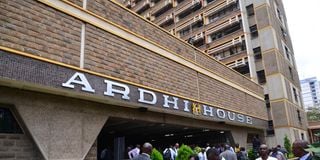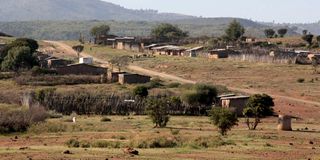Premium
Turkana community to be paid for vast land seized by KDF

Ministry of Lands headquarters at Ardhi House in Nairobi in mid March 2015.
Members of the Turkana community living in Samburu County have a reason to smile after a judge directed the government to compensate them for over 1,000-acre parcel of land that was taken over by the military.
Justice Kossy Bor, on Friday, ruled that the community did not willingly give their land to the Kenya Defence Forces (KDF), but it was taken away from them on the strength of a gazette notice.
The Environment and Land court judge said the move amounted to compulsory acquisition of the land held by the Turkana Community in Kawap and Suguta Valley in Samburu County.
The judge, therefore, directed the National Land Commission (NLC) to ensure that the community is compensated within 18 months from the date of the judgement.
The process will be led NLC and a consultative team comprising members of the community, the Attorney General and Ministry of Defence.
“The Consultative Team must ensure that the process is inclusive and as many as possible members of the Turkana community who were displaced and directly affected by the acquisition of the Turkana community land in Kawap for KDF participate in the process and that their participation is meaningful and not merely tokenistic,” said the judge.
The judge said the team must take into account the viewpoints of women, including widows, children, the elderly, youth and persons with disability.
Ancestral land invaded
The community, led by Lawrence Lorunyei and Lorikot Egiron sued the government, accusing the KDF of unlawfully taking over their ancestral land in Samburu County.
They argued that the Samburu County government, in connection with the KDF set aside their land in Kawap and Suguta Valley for military training.
The land in the northern part of Samburu and South of Lake Turkana was predominantly occupied by Turkana people, where they have been using it for grazing, habitation and other community services.
The two leaders said the Turkana community had lived in the land from precolonial times and that the colonial records confirmed that the land was occupied by the community before the colonial administration.
They said they received information that the land which had been set aside for KDF near Maralal in Samburu County would be given back to the Samburu community and in exchange, the land belonging to the Turkana community in Kawap would be given to KDF.
They then filed a petition with the NLC in 2017 and the commission promised to investigate the issue but went quiet.
The community said it relied on the large swathe of land for habitation, grazing and watering holes during the dry season.
They pointed out that the Samburu County government and the national government did not consult the Turkana community and its leaders to get their input and views on the annexation of their community land as required by the constitution and the Community Land Act.
Privatisation of land
According to the community, the situation was aggravated by the increased unavailability of land for pasture due to the privatisation of community land through conservancies south of Samburu County such as Namunyak Conservancy which forms part of the Northern Rangeland Trust.
They expressed fear that owing to the minority status of the Turkana community in the national and (Samburu) county governments, it was unlikely that their grievances would be address
They argued that the Turkana community in Northern Samburu would continue to suffer in silence as their constitutional rights were violated.
Land swap claim
The military said it exchanged the land near Maralal with the one in Kawap after engaging the county government, NLC and the Attorney for a solution of persistent encroachment of the military land in Maralal.

Morijo shopping center on the Maralal-Baragoi road in Samburu County.
According to the military, it inspected the land in 2020 and found it bare and unoccupied.
The court further heard that the land was dominated by rugged volcanic raised features and deep gullies characterised by lava rocks and volcanic ash type of soil.
KDF added that the land was unsuitable for human habitation but useful for military training and defence activities.
The county government said the land was identified because it was arid with volcanic ash and was thus unsuitable for agricultural or economic use being a harsh terrain prone to insecurity and that it had never been used for human settlement.
Also Read: KDF, a retailer, and church: The making of Sh2.8bn land saga
In the judgment, Justice Bor said the steps taken towards the adjudication of the suit land point to recognition of the claim of the Turkana community in Kawap to the suit land as that community’s land.
“The fact that the area was declared an adjudication section by the Samburu County Government on 12/3/2014 undeniably confirmed that the Turkana community in Kawap had legitimate rights and interests over the suit land as community land,” said the judge.
She said it was a recognition that their presence and use of the land were substantial enough to warrant consideration of the creation of the Kawap Adjudication Section.
The judge added that it was imperative for the Turkana community in Kawap to be consulted so that it could make recommendations and have its input considered when the decision to allocate the suit land to KDF was made.
“It is not clear how the exchange of the KDF land in Maralal for the suit land was undertaken because there was no valuation of the two parcels of land said to have been exchanged,” said the judge.
The court said the fact that no form of compensation was paid to the Turkana community in Kawap raised doubts as to whether the process of allocation of the suit land by the county government to KDF in concert with the Attorney General was lawful.
“What emerges from this petition is that the marginalisation and violations of the rights of the members of the Turkana community to property guaranteed by Article 40 of the Constitution was closely linked and intertwined with violations of their other rights to non-discrimination, human dignity, fair administrative action, participation among other others,” said the judge.





